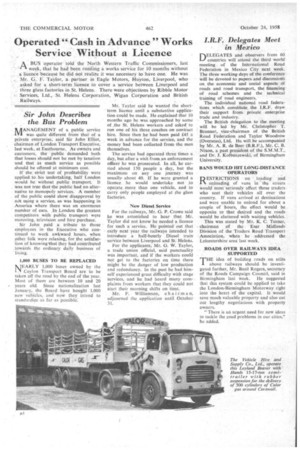Operated Cash •in Advance " Works Service Without a Licence
Page 38

If you've noticed an error in this article please click here to report it so we can fix it.
A BUS operator told the North Western Traffic Commissioners, last Week, that he had been runiiing a works service for 10 months without a licence because he did not realize it was necessary to have one. He was Mr. 6. F. Taylor a partner in Eagle Motors, Huyton, Liverpool, who asked for a short-term licence to cover a service between Liverpool and three glass factories in St. Helens. There were objections by Ribble Motor Services, Ltd., St. Helens Corporation, Wigan Corporation and British Railways.
Mr. Taylor said he wanted the shortterm licence until a substantive application could be made. He explained that 10 months ago he was approached by some of the St. Helens workers and asked to run one of his _three coaches on contract hire. Since then he had been paid £45 a week in advance for the service, and the money had been collected from the men themselves.
The service had operated three times a day, but after a visit from an enforcement officer he was prosecuted. In all, he carried about 150 people a day, but the maximum on any one journey was usually about 40. If he were granted a licence he would undertake not to operate more than one vehicle, and to carry only people employed at the glass factories.
New Diesel. Service
For the railways, Mr. G. P. Crowe said he was astonished to hear that Mr. Taylor did not know he needed a licence for such a service. He pointed out that early next year the railWays intended to introduce a half-hourly Diesel train service between Liverpool and St Helens.
For the applicants, Mr. G. W. Taylor, a trade union 'official, said punctuality was important, and if the workers could not get to the factories on time there might be the danger of low production and redundancy. In the past he had himself experienced great difficulty with stage services, and he had heard many complaints from workers that they could not start their morning shifts on time:
Mr. F. Williamson, ch air m a n, adjourned the application until . October 11,




































































































